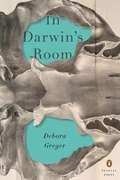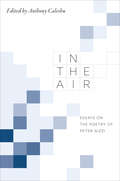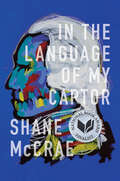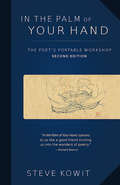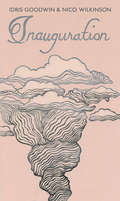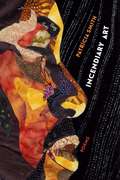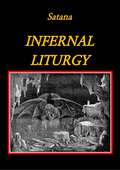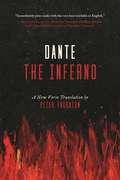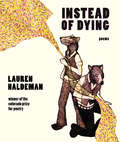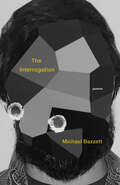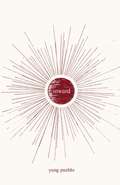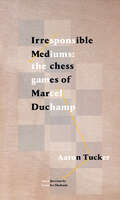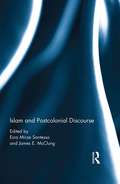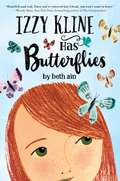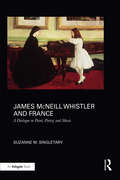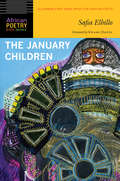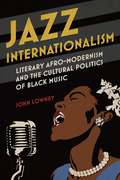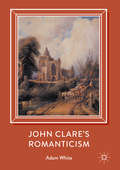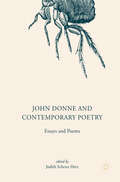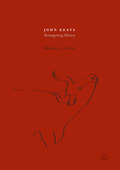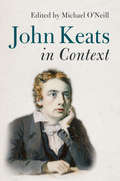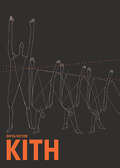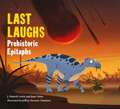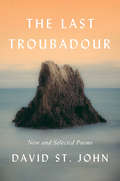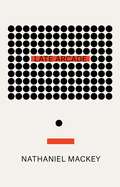- Table View
- List View
In Darwin's Room
by Debora GregerAn artful new collection from a poet who sees the extraordinary within the everydayIn her tenth volume of poetry, Debora Greger looks outward from the broadmindedness of the interior. Whether she finds herself in Venice, in London, or young again in the sagebrush desert of her childhood, the reader may feel Greger is both there and not there—her landscapes are haunted by memory, even in the act of experience. Not shying from the raw or savage in life, not ignoring the small moments of salvation or grace, she finds in every room an entrance to another world. Darwin’s college quarters prove not far from his cabin on the Beagle. A dress shop in Virginia reveals itself a Federal parlor through which a battle of the Civil War was fought. Returning to old scenes with a new eye, Greger proves herself a poet of quiet cunning, of grand scenes and small awakenings.From the Trade Paperback edition.
In the Air: Essays on the Poetry of Peter Gizzi
by Anthony CaleshuThis first critical book of essays on the poetry of Peter Gizzi shows how his work extends the traditions of nineteenth- and twentieth-century modernism while also reclaiming the living presence of the “lyric” in its capacity to sing of the human predicament. Gizzi is author of seven critically acclaimed books of poetry, including most recently Threshold Songs and Archeophonics, a finalist for the National Book Award in 2016. Lauded contributors, including Ben Lerner, Michael Snediker, Marjorie Perloff, and Charles Altieri, explore Gizzi’s poetry for its embodiment of an American tradition—extending the poetics of Whitman, Dickinson, and Stevens, amongst others—while also exhibiting a twenty-first-century sensibility, perpetuating a new grammar and syntax to capture our place in the world today. Each essayist, in turn, works through close-readings of some of the most important poems of our times, enriching our understanding of a poetry of the mind which never loses track of what it means to feel.
In the Language of My Captor (Wesleyan Poetry Series)
by Shane Mccrae<P>Acclaimed poet Shane McCrae’s latest collection is a book about freedom told through stories of captivity. Historical persona poems and a prose memoir at the center of the book address the illusory freedom of both black and white Americans. <P>In the book’s three sequences, McCrae explores the role mass entertainment plays in oppression, he confronts the myth that freedom can be based upon the power to dominate others, and, in poems about the mixed-race child adopted by Jefferson Davis in the last year of the Civil War, he interrogates the infrequently examined connections between racism and love. <P> A reader’s companion is available at wesleyan.edu/wespress/readerscompanions.
In the Palm of Your Hand, Second Edition: A Poet's Portable Workshop
by Steve Kowit*Over 90,000 copies sold* Long an anchor text for college and junior college writing classes, this illuminating and invaluable guide has become a favorite for beginning poets and an ever-valuable reference for more advanced students who want to sharpen their craft, expand their technical skills, and engage their deepest memories and concerns.This edition adds Steve Kowit’s famous essay on poetics “The Mystique of the Difficult Poem,” in which he argues stirringly and forcefully that a poem need not be obscure to be great. Ideal for teachers who have been searching for a way to inspire students with a love for writing--and reading--contemporary poetry. It is a book about shaping your memories and passions, your pleasures, obsessions, dreams, secrets, and sorrows into the poems you have always wanted to write. If you long to create poetry that is magical and moving, this is the book you've been looking for. Here are chapters on the language and music of poetry, the art of revision, traditional and experimental techniques, and how to get your poetry started, perfected, and published. Not the least of the book's pleasures are model poems by many of the best contemporary poets, illuminating craft discussions, and the author's detailed suggestions for writing dozens of poems about your deepest and most passionate concerns.
Inauguration
by Idris Goodwin Nico WilkinsonInspired by inaugural poets of the past, Inauguration is a collection of poems crafted in response to the commencement of a new administration. Writing out of Colorado Springs, Colorado, one of the most divided cities in the country, Goodwin and Wilkinson trade ruminations of survival in a hostile political climate. Yet Inauguration transcends partisan rhetoric. It is a rallying call to reflect back as we collectively forge our way forward.
Incendiary Art: Poems
by Patricia SmithOne of the most magnetic and esteemed poets in today’s literary landscape, Patricia Smith fearlessly confronts the tyranny against the black male body and the tenacious grief of mothers in her compelling new collection, Incendiary Art. She writes an exhaustive lament for mothers of the "dark magicians," and revisits the devastating murder of Emmett Till. These dynamic sequences serve as a backdrop for present-day racial calamities and calls for resistance. <p><p> Smith embraces elaborate and eloquent language— "her gorgeous fallen son a horrid hidden / rot. Her tiny hand starts crushing roses—one by one / by one she wrecks the casket’s spray. It’s how she / mourns—a mother, still, despite the roar of thorns"— as she sharpens her unerring focus on incidents of national mayhem and mourning. <p> Smith envisions, reenvisions, and ultimately reinvents the role of witness with an incendiary fusion of forms, including prose poems, ghazals, sestinas, and sonnets. With poems impossible to turn away from, one of America’s most electrifying writers reveals what is frightening, and what is revelatory, about history.
Infernal Liturgy
by Roberto Carlos Pavón Carreón SatanaThe most original poems book of the twenty-first century ...
The Inferno: A New Verse Translation (Forsyte chronicles)
by Dante AlighieriThis enthralling new translation of Dante’s Inferno "immediately joins ranks with the very best” (Richard Lansing).One of the world’s transcendent literary masterpieces, the Inferno tells the timeless story of Dante’s journey through the nine circles of hell, guided by the poet Virgil, when in midlife he strays from his path in a dark wood. In this vivid verse translation into contemporary English, Peter Thornton makes the classic work fresh again for a new generation of readers. Recognizing that the Inferno was, for Dante and his peers, not simply an allegory but the most realistic work of fiction to date, he points out that hell was a lot like Italy of Dante's time. Thornton's translation captures the individuals represented, landscapes, and psychological immediacy of the dialogues as well as Dante's poetic effects.The product of decades of passionate dedication and research, his translation has been hailed by the leading Dante scholars on both sides of the Atlantic as exceptional in its accuracy, spontaneity, and vividness. Those qualities and its detailed notes explaining Dante's world and references make it both accessible for individual readers and perfect for class adoption.
Instead of Dying (Colorado Prize for Poetry)
by Lauren HaldemanInvoking spiders and senators, physicists and aliens, Lauren Haldeman’s second book, Instead of Dying, decodes the world of death with a powerful mix of humor, epiphany, and agonizing grief. In the spirit of Calvino’s Invisible Cities, these poems compulsively imagine alternate realities for a lost sibling (“Instead of dying, they inject you with sunlight & you live” or “Instead of dying, you join a dog-sledding team in Quebec”), relentlessly recording the unlived possibilities that blossom from the purgative magical thinking of mourning. Whether she is channeling Google Maps Street View to visit a scene of murder (“Because / a picture of this place is / also a picture of you”) or investigating the origins of consciousness (“Yes, alien / life-forms exist / they are your thoughts”), Haldeman wrenches verse into new sublime forms, attempting to both translate the human experience as well as encrypt it, inviting readers into realms where we hover, plunge, rise again, and ascend.
The Interrogation: Poems
by Michael BazzettThis surreal, darkly humorous, and relentlessly probing poetry collection resides at “the disorienting juncture between fairy tale and nightmare” (Publishers Weekly).Suffused in psychology, uncertainty, and desire, Michael Bazzett’s The Interrogation is an unsparingly honest catechism of the self. In the title poem, a speaker—at once questioner and questioned—insistently asks: Who? What? Where? Why? Why our cruelty? Why our loneliness? And how do we connect?These poems read like disorienting fables and seemingly familiar folktales. In them, we are escorted to dreamlike cities, brought into the rich earth under a simple mattress, and drawn inside the mind, where “Nobody fails at meditation / like I do.”
Inward
by Yung PuebloInward is a collection of poetry, quotes, and prose that explores the movement from self love to unconditional love, the power of letting go, and the wisdom that comes when we truly try to know ourselves. It serves as a reminder to the reader that healing, transformation, and freedom are possible.
Irresponsible Mediums: The Chess Games of Marcel Duchamp
by Aaron TuckerWith an Introduction by World Chess Champion Jennifer ShahadeIn 1968, avant-garde artist Marcel Duchamp and composer John Cage exhibited Reunion, a chess performance that took place in Toronto. Whenever Duchamp or Cage moved a piece, it generated a musical note until the game was transformed into a symphony.Inspired by this performance, Irresponsible Mediums—poet and academic Aaron Tucker's second full-length collection of poems—translates Duchamp's chess games into poems using the ChessBard (an app co-created by Tucker and Jody Miller) and in the process, recreates Duchamp's joyous approach to making art, while also generating startling computer-made poems that blend the analog and digital in strange and surprising combinations.
Islam and Postcolonial Discourse: Purity and Hybridity
by Esra Mirze Santesso James McClungLargely, though not exclusively, as a legacy of the 2001 attack on the World Trade Center, Islamic faith has become synonymous in many corners of the media and academia with violence, which many believe to be its primary mode of expression. The absence of a sophisticated recognition of the wide range of Islamic subjectivities within contemporary culture has created a void in which misinterpretations and hostilities thrive. Responding to the growing importance of religion, specifically Islam, as a cultural signifier in the formation of a postcolonial self, this multidisciplinary collection is organized around contested terms such as secularism, Islamopolitics, female identity, and Islamophobia. The overarching goal of the contributors is to facilitate a deeper understanding of the full range of experiences within Islam as well as the figure of the Muslim, thus enabling a new set of questions about religion’s role in shaping postcolonial identity.
Izzy Kline Has Butterflies
by Beth AinSo many moments—big and small—make up a year, and Beth Ain chronicles them all in this heartwarming novel in verse, perfect for fans of Fish in a Tree and verse novels like Brown Girl Dreaming and The Crossover. Fourth grade is here, and Izzy Kline is nervous! There are plenty of reasons for the butterflies in her stomach to flap their wings. There’s a new girl in her class who might be a new best friend. The whole grade is performing Free to Be . . . You and Me—and Izzy really wants a starring role. And new changes at home are making Izzy feel like her family is falling apart. First-day jitters, new friends, an audition . . . How many butterfly problems can one fourth grader take?
James McNeill Whistler and France: A Dialogue in Paint, Poetry, and Music
by Suzanne SingletaryJames McNeill Whistler and France: A Dialogue in Paint, Poetry, and Music is the first full-length and in-depth study to position this painter within the overall trajectory of French modernism during the second half of the nineteenth century and to view the artist as integral to the aesthetic projects of its most original contributors. Suzanne M. Singletary maintains that Whistler was in a unique situation as an insider within the emerging French avant-garde, thereby in an enviable position to both absorb and transform the innovations of others – and that until now, his widespread influence as a catalyst among his colleagues has been neither investigated nor appreciated. Singletary contends that Whistler’s importance rivals that of Manet, whose multi-layered (and often unexpected) interconnections with Whistler are the focus of one chapter. In addition, Whistler’s pivotal role in linking the legacies of Baudelaire, Delacroix, Gautier, Wagner, and other mid-century innovators to the later French Symbolists has previously been largely ignored. Courbet, Degas, Monet, and Seurat complete the roster of French artists whose dialogue with Whistler is highlighted.
The January Children (African Poetry Book)
by Safia Elhillo Kwame DawesIn her dedication Safia Elhillo writes, “The January Children are the generation born in Sudan under British occupation, where children were assigned birth years by height, all given the birth date January 1.” <P><P>What follows is a deeply personal collection of poems that describe the experience of navigating the postcolonial world as a stranger in one’s own land. <P><P>The January Children depicts displacement and longing while also questioning accepted truths about geography, history, nationhood, and home. The poems mythologize family histories until they break open, using them to explore aspects of Sudan’s history of colonial occupation, dictatorship, and diaspora. <P><P>Several of the poems speak to the late Egyptian singer Abdelhalim Hafez, who addressed many of his songs to the asmarani—an Arabic term of endearment for a brown-skinned or dark-skinned person. Elhillo explores Arabness and Africanness and the tensions generated by a hyphenated identity in those two worlds. No longer content to accept manmade borders, Elhillo navigates a new and reimagined world. <P><P>Maintaining a sense of wonder in multiple landscapes and mindscapes of perpetually shifting values, she leads the reader through a postcolonial narrative that is equally terrifying and tender, melancholy and defiant.
Jazz Internationalism: Literary Afro-Modernism and the Cultural Politics of Black Music
by John LowneyJazz Internationalism offers a bold reconsideration of jazz's influence in Afro-modernist literature. Ranging from the New Negro Renaissance through the social movements of the 1960s, John Lowney articulates nothing less than a new history of Afro-modernist jazz writing. Jazz added immeasurably to the vocabulary for discussing radical internationalism and black modernism in leftist African American literature. Lowney examines how Claude McKay, Ann Petry, Langston Hughes, and many other writers employed jazz as both a critical social discourse and mode of artistic expression to explore the possibilities ”and challenges ”of black internationalism. The result is an expansive understanding of jazz writing sure to spur new debates.
John Clare's Romanticism
by Adam WhiteThis book offers a major reassessment of John Clare's poetry and his position in the Romantic canon. Alert to Clare's knowledge of the work of his Romantic contemporaries and near contemporaries, it puts forward the first extended series of comparisons of Clare's poetry with texts we now think of as defining the period - in particular poems by Robert Burns, William Wordsworth, Lord Byron, and John Keats. It makes fully evident Clare's original contribution to the aesthetic culture of the age by analysing how he explores a wide range of concerns and preoccupations which are central to, and especially privileged in, Romantic-period poetics, including 'fancy', the sublime, childhood, ruins, joy, 'poesy', and a love lyric marked by a peculiar self-consciousness about sincere expression. At the heart of this book is the claim that the hitherto under-scrutinised subjective stances, transcendent modes, and abstract qualities of Clare's lyric poetry situate him firmly within, and as fundamentally part of, Romanticism, at the same time as his writing constitutes a distinctive contribution to one of the most fascinating eras of English literature.
John Donne and Contemporary Poetry
by Judith Scherer HerzThis collection of poems and essays by both poets and scholars explores how John Donne's writing has entered into the language, the imagination, and the navigation of erotic and spiritual desires and experiences of twentieth- and twenty-first-century writers. The chapters chart a winding path from a description of the Donne and Contemporary Poetry Project at Fordham University to an encounter with the Holy Sonnets to a set of modern holy sonnets and then through the work of a poet who used Donne's Devotions on Emergent Occasions to chart his own dying. There are further poems on sickness and recovery, an essay on Donne and disease that brings in the work of an Australian poet, and several chapters of poems with various Donnean echoes. Of the final four chapters, one places Donne in relation to another poet and one to the Psalms, followed by two chapters on Donne's speech figures and his poetics.
John Keats
by William A. UlmerThis book considers Keats's major poems as exercises in Romantic historicism. The poetry's rich allusiveness represents Keats's effort to reclaim the British canon for Cockney revisionism, and reveals Keats characteristically invoking the past to define his contemporary cultural politics. The book begins by discussing Keats's Cockney traditionalism in its Regency context and then proceeds through the poet's career in chronological order. There are chapters on history and vocation in the poet's first volume, the failed idealism of 'Endymion', gender and audience in the Medieval Romances, the 'Ode on a Grecian Urn' in historical context, secularism and consolation in the other great Odes, and then the two 'Hyperion' fragments, in which history ramifies beyond poetic method to become the explicit subject of inquiry. The result is a stimulating reassessment of Keats's intellectual development and most admired poems.
John Keats in Context (Literature in Context)
by Michael O’NeillJohn Keats (1795–1821) continues to delight and challenge readers both within and beyond the academic community through his poems and letters. This volume provides frameworks for enhanced analysis and appreciation of Keats and his work, with each chapter supplying a succinct, informed, and accessible account of a particular topic. Leading scholars examine the life and work of Keats against the backdrop of his influences, contemporaries, and reception, and explore the interaction of poet and world. The essays consider his enduring but ever-altering appeal, engage with critical discussion and debate, and offer revisionary close reading of the poems and letters. Students and specialists will find their knowledge of Keats's life and work enriched by chapters that survey subjects ranging from education, relationships, and religion to art, genre, and film. Covers a vast range of topics, taking a fresh look at the mutual exchange of influence between the poet and his world. Concise and incisive chapters by leading names in the field will appeal to specialists as well as students. Keeps the poems at the forefront of the contextual picture, enabling enhanced analysis and appreciation of Keats's work.
KITH
by Divya Victorkith [noun] one's friends, acquaintances, neighbours, or relations.In Kith, award-winning writer Divya Victor engages Indian-American diasporic culture in the twentieth century, via an autobiographical account that explores what 'kith' might mean outside of the national boundaries of those people belonging to the Indian and South East Asian diasporas.Through an engagement with the effects of globalization on identity formation, cultural and linguistic exchange, and demographic difference, Kith explores questions about race and ethnic difference: How do 'brownness' and 'blackness' emerge as traded commodities in the transactions of globalization? What are the symptoms of belonging? How and why does 'kith' diverge from 'kin,' and what are the affects and politics of this divergence? Historically-placed and well-researched, Kith is an unflinching and simultaneous account of both systemic and interpersonal forms of violence and wounding in the world today.
Last Laughs: Prehistoric Epitaphs
by Jane Yolen J. Patrick LewisPoems framed as epitaphs for extinct prehistoric animals hit the proverbial (coffin) nail on the head in this darkly humorous collection from expert poets Jane Yolen and J. Patrick Lewis.Macabre, ironic, and witty epitaphs share how prehistoric creatures like the terror bird, the woolly mammoth, and the T-rex met their demise. The ever-entertaining J. Patrick Lewis and the inimitable Jane Yolen offer a collection organized by era, with posthumous poems paired with short secondary text providing additional, factual information about each creature.
The Last Troubadour: New and Selected Poems
by David St. JohnA haunting and intimately observed new collection from David St. John, a poet of soaring imagination and passionate candor In The Last Troubadour, David St. John has given us a collection of new and selected poems of astonishing beauty, precise and keenly observed but also touched with sensuality and deep feeling. Nothing is too small to escape notice (in “Guitar” St. John reflects on the beauty of that word) or too large to be explored-the suicide of a friend, the illness of a lover, or the texture of longing and desire. A sharp observer of landscapes within and without, St. John directs his empathetic gaze and vivid, inventive voice to investigating both the darkest and the most inspiring parts of being human, the small moments between friends and lovers as well as the groundswells that alter lives. At times lyrical, sometimes conversational, occasionally wry and playful, St. John’s poetry reveals an expansive vision animated by “intimacy and subtlety, and by a disturbing force, the work of an urgent sensibility and a true ear.” (W.S. Merwin) The beauty, music, and artistry of David St. John’s widely admired work is fully on display in this masterful collection.
Late Arcade
by Nathaniel MackeyA new volume of the singular, ongoing, great American jazz novel Nathaniel Mackey’s Late Arcade opens in Los Angeles. A musician known only as N. writes the first of a series of letters to the enigmatic Angel of Dust. N.’s jazz sextet, Molimo m’Atet, has just rehearsed a new tune: the horn players read from The Egyptian Book of the Dead with lips clothespinned shut, while the rest of the band struts and saunters in a cosmic hymn to the sun god Ra. N. ends this breathless session by sending the Angel of Dust a cassette tape of their rehearsal. Over the next nine months, N.’s epistolary narration follows the musical goings-on of the ensemble. N. suffers from what he calls “cowrie shell at- tacks”—oil spills, N.’s memory of his mother’s melancholy musical Sundays— which all becomes the source of fresh artistic invention. Here is the newest installment of the National Book Award-winner Nathaniel Mackey’s From a Broken Bottle Traces of Perfume Still Emanate, the great American jazz novel of “exquisite rhythmic lyricism” (Bookforum).
